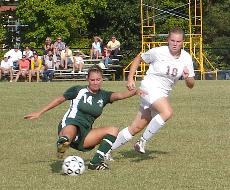Athletics at Guilford are mostly spoken about, even though they often speak for themselves. And while they do speak, they are seldom heard. “Why should we care about athletics?” some would ask. “It has nothing to do with my career goals,” they would say; or, “It limits the full Guilford experience.” Others may call sports “a waste of time and resources,” and athletes “intellectually inferior,” or admit they “just don’t care.”
“I don’t know whether people should care about sports,” said junior Micah Rushing, a football player. “But that goes for anything that anybody is passionate about.”
Regardless of whether one cares about Guilford athletics, however, one cannot deny the fact that one-fourth of all traditional students are on a sports team.
“I cannot think of another activity that involves one quarter of the students on a regular basis, except perhaps eating in the cafeteria,” said President Kent Chabotar.
“I think athletics has a critical role in a liberal arts college,” said Randy Doss Vice President for Enrollment and Campus Life. He read from the from the college’s Statement of Purpose: “Guilford College is an educational community which strives to integrate personal, intellectual, physical and spiritual growth,” with emphasis on the word “physical.”
Since Division III schools give no athletic scholarships whatsoever, athletes virtually pay to play, for the love of the game. Thus, according to Athletic Director Marion Kirby, playing sports at Guilford is more about the athletes than the spectators.
“Our department is striving to provide a wholesome activity for students to pursue things they are passionate about,” he said.
Apart from staying in shape, many students find a source of relaxation in sports. For many, being on a team helps the adjustment to life in college.
“It was an already-established structure that made the transition really easy to me,” said junior Brian Burton, a baseball player.
Through athletics, students also get to befriend others with whom they have much in common and can form lasting relationships. Many say that they have improved their time management, discipline and teamwork skills, and student-athletes tend to do better academically during their competetive seasons.
“Anytime you have a group of people that establishes a common goal, it becomes very special,” said Assistant Football Coach Dearrion Snead.
“When I look at football, it shows how effective people working together can be,” said Rushing.
To first-year and cross country runner Christopher Walker, playing sports helps build character. “People tend to think of
athletics as a sport in a season, but it really lasts longer than a season,” Walker said. “It not only teaches you how to play the game, but also how to apply things to your life.”
“The goals of athletics at any school should be aligned with the goals of the general educational mission,” said Bob Malekoff, Assistant Professor of Sports Studies.
According to Campus Ministry Coordinator Max Carter, playing sports brings the kind of skills that are important after Guilford, and, even more so, it gives the community some pride in the values and ideals that Guilford has stood for.
“In a study done at the Harvard Graduate School of Education,” Malekoff said, “80 percent cited extracurricular activities, such as athletics, as these during which they learned the most.”
Many see sports not only as an opportunity to bring people together, but also as a source of community pride and morale. According to women’s lacrosse Head Coach Matthew Grosso, sports are also a good way to represent Guilford.
“Why do most people know where schools are?” Grosso asked. “In a strange world, if someone just said ‘Duke University’ to me, and I didn’t know anything about sports . a lot of times, people know schools because of athletics.”
Carter takes pride in the College’s historical achievements: Japanese Americans playing for Guilford during WWII, the NAIA Men’s Basketball title in 1973, Women’s Tennis National Title in 1981, and Jordan Snipes’ 86-foot last-second shot at rival Randolph-Macon that made the sports headlines last year, to name a few.
“Guilford is a smaller school, and, with any small school, you have to introduce people to the school,” Grosso said.
It is true that many student-athletes would not have come to Guilford, were it not for athletics.
“I wouldn’t be here without athletics. Sports are my passion,” said senior Jennifer King, who plays both basketball and softball.
According to Carter, athletics also generate valuable diversity.
“It brings in students who wouldn’t under any other circumstances come to a place like Guilford,” he said. “If we have to build a diverse community, athletes are absolutely essential because otherwise we wouldn’t have an awful lot of conservative students here.”
Lastly, with 77 percent of Guilford’s operating budget coming from tuition fees, having 300 students who participate in athletics makes a priceless contribution, especially in view of the college’s long-time struggles to make its class, when athletic recruiting was the major difference between success and failure.
Senior science major Jai Dave described athletics as a “slow, arduous process of self-improvement” – the timeless human endeavor for perfection.
“By [that process], you gain something more than you started with,” Dave said. “You actually become something else. It is a process of becoming. We learn to figure out our potentials, our possibilities, our passions, our strengths and our weaknesses. So athletics is an integral part of human life that can’t be distinguished and separated from it.”

